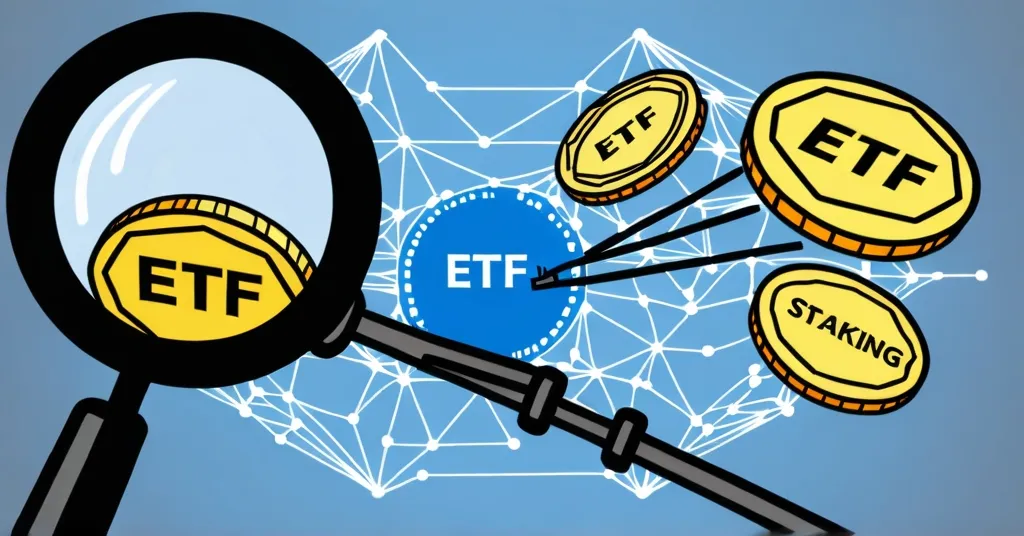SEC Intensifies Crypto Staking Scrutiny, Signals New Regulatory Framework

SEC’s Intense Focus on Crypto Staking Points to New Regulatory Guidance
The U.S. Securities and Exchange Commission (SEC) is ramping up its scrutiny of crypto staking, signaling that new regulatory guidance may be on the horizon. This increased focus comes as the SEC seeks to better understand staking, a method allowing crypto holders to earn rewards by participating in blockchain network operations.
- SEC examining crypto staking closely
- Industry engagement through meetings and webinars
- Two staking models proposed for crypto ETPs
- CBOE BZX Exchange’s proposal for 21Shares Core Ethereum ETF staking
The SEC’s Crypto Task Force has been actively engaging with industry players, such as Jito Labs and Multicoin Capital Management, to explore how staking can be incorporated into crypto exchange-traded products (ETPs). ETPs are investment vehicles traded on stock exchanges, similar to stocks. During these discussions, two models were highlighted: the Services Model, where native assets like Ethereum are staked through validator service providers, and the LST Model, which involves holding liquid staking tokens (LSTs). These tokens represent staked versions of native assets and can be traded while the assets are locked in staking.
In these meetings, several concerns were raised, including when investors can get their money back (redemption timing), tax implications for grantor trusts, and whether staking services should be classified as securities transactions. Firms argued that prohibiting staking in ETPs would have detrimental effects, stating it “harms investors, by crippling the productivity of the underlying asset and depriving investors of potential returns, and network security, by preventing a significant portion of an asset’s circulating supply from being staked.”
CBOE BZX Exchange has taken a bold step by submitting Form 19b-4 to the SEC, proposing staking activities for the 21Shares Core Ethereum ETF. This follows the SEC’s approval of spot Ethereum ETFs last year, marking a significant move toward integrating staking into traditional financial products. Initially, 21Shares and ARK Invest attempted to launch a staked Ethereum ETF but had to remove the staking feature from their application. ARK Invest later withdrew, leaving 21Shares to proceed alone.
FOX Business journalist Eleanor Terrett reported that the SEC is “very, very interested” in staking, even requesting a memo from the industry detailing the different types of staking and their benefits. This engagement suggests that the SEC is not only aiming to regulate but also to understand and potentially foster the growth of staking within the crypto ecosystem.
The SEC’s approach to crypto staking has been evolving, especially under the Trump administration, which has shown a more crypto-friendly stance. The recent rescission of SAB 121, as noted by Commissioner Peirce, has removed a significant regulatory obstacle to crypto custody, paving the way for the development of staking programs within ETFs. This move, coupled with the establishment of the Crypto Task Force, indicates a shift toward a more coherent regulatory framework that could support innovation while protecting investors.
The potential impact of allowing staking in Ethereum ETFs is significant. It could enhance returns for investors and serve as a catalyst for ETH price increases. Analysts suggest that a more transparent legal framework for staking could encourage wider adoption, particularly among institutions seeking yield options in the digital asset market.
However, it’s not all sunshine and rainbows. Staking isn’t without its risks, such as the possibility of slashing (losing staked assets due to validator misbehavior), and critics argue that the SEC’s regulatory approach might stifle innovation if not carefully balanced. The SEC must navigate these complexities to ensure a regulatory framework that fosters innovation while safeguarding investors.
The SEC’s decision on staking could have far-reaching implications. Allowing staking in crypto ETPs could drive increased institutional participation in the crypto market, potentially leading to broader adoption of crypto-based ETFs, including those for other assets like XRP. Yet, the SEC must ensure that the regulatory framework remains robust enough to protect investors from the inherent risks of staking.
Key Takeaways and Questions
- What is the SEC’s current stance on crypto staking?
The SEC is actively examining crypto staking and considering the issuance of new regulatory guidance on the practice.
- How is the SEC engaging with the crypto industry regarding staking?
The SEC is engaging with the industry through meetings and webinars, as well as requesting industry input on different types of staking and their benefits.
- What are the two models discussed for implementing staking in crypto ETPs?
The two models discussed are the Services Model, which involves staking native assets through validator service providers, and the LST Model, which involves holding liquid staking tokens representing staked versions of native assets.
- What concerns were addressed in the SEC’s meeting with Jito Labs and Multicoin Capital Management?
Concerns included when investors can get their money back, tax implications for grantor trusts, and the classification of staking services as securities transactions.
- What potential impact does the SEC’s decision on staking have on investors?
Allowing staking in crypto ETPs could increase potential returns for investors, while prohibiting it could harm investors by reducing the productivity of their holdings and affecting network security.
- What is the significance of the CBOE BZX Exchange’s proposal regarding the 21Shares Core Ethereum ETF?
The proposal marks the first request to incorporate staking into an ETF following the SEC’s approval of spot Ethereum ETFs, potentially setting a precedent for future crypto financial products.



